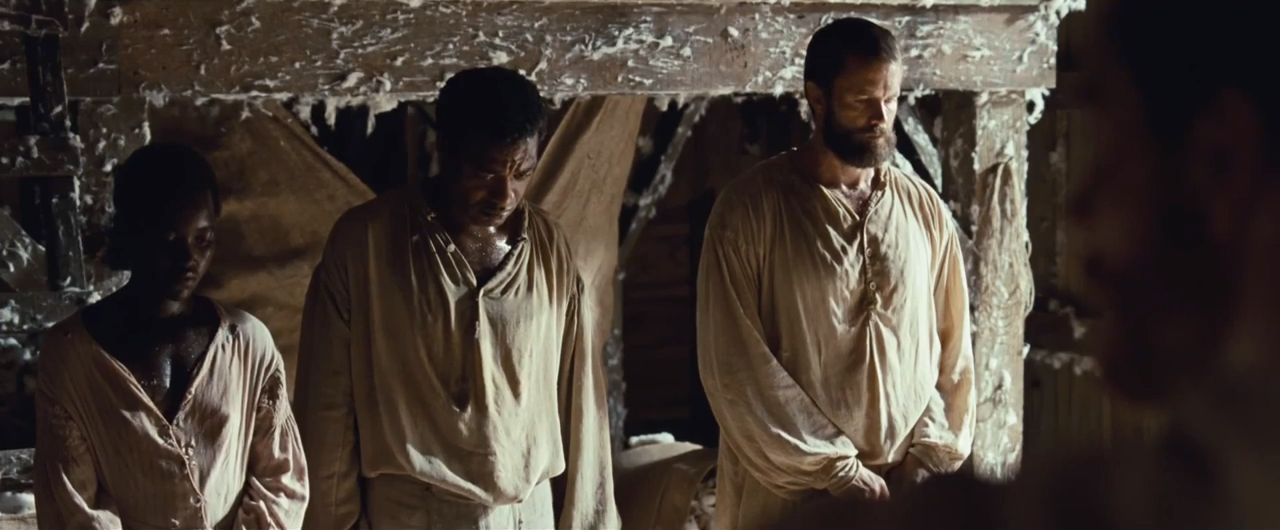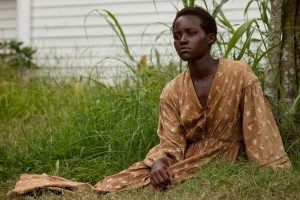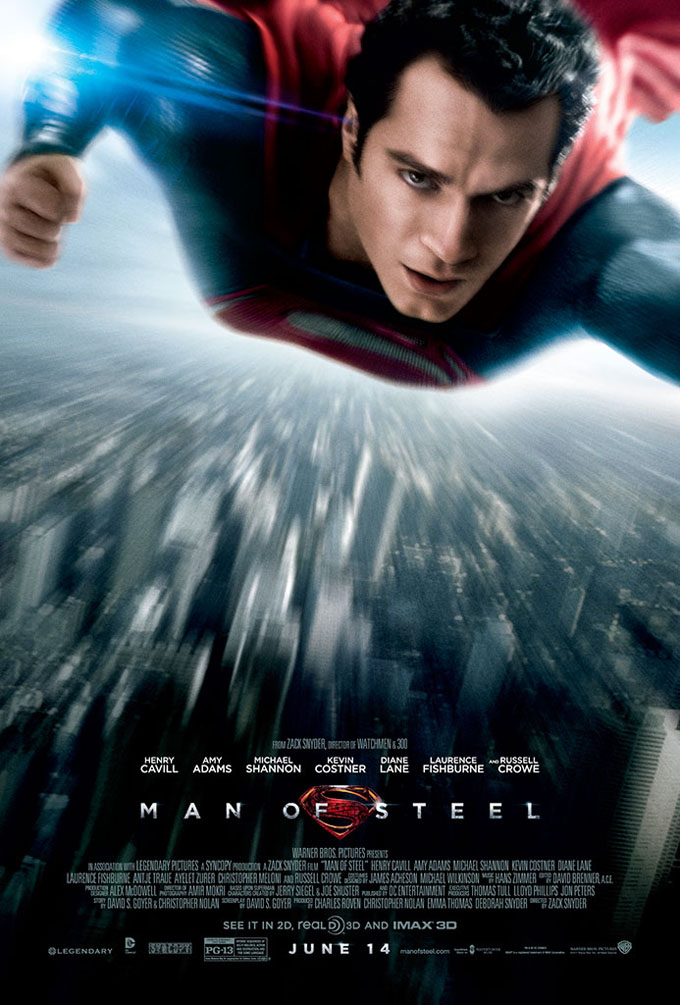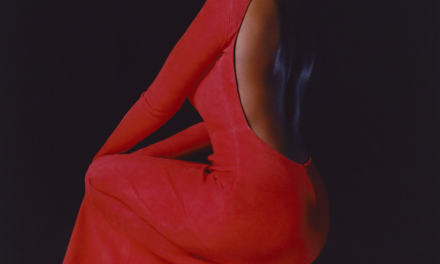This review was previously written and published on November 10, 2013. It is being reprinted today because 12 Years A Slave has been nominated for nine Academy Awards: Best Actor (Chiwetel Ejiofor), Best Supporting Actor (Michael Fassbender), Best Supporting Actress (Lupita Nyong’o), Best Editing, Best Costume Design, Best Production Design, Best Adapted Screenplay, Best Director (Steve McQueen) and Best Picture of the Year. My thoughts and opinions on the film haven’t changed since I last saw it in November.
In 1841, Solomon Northup, a free black man, was drugged, kidnapped, transported to New Orleans and sold into slavery. Northup (Chiwetel Ejiofor), a talented musician who was living with his wife and two children in Sarasota Springs, New York, had been lured to Washington, D.C. by two men (played by Scoot McNairy and Taran Killam from Saturday Night Live) who promised him a lucrative touring gig. After a night of talking and drinking with the two men, Solomon woke up in a dungeon, chained to the floor.
In that scene — one of the most heartbreaking scenes in a film full of them — you see every emotion on Solomon’s face. You see his shock. You see his denial. You see him trying to figure things out and trying to put the pieces together. And then, you see his realization: he’s been duped. He’s going to be sold into slavery. Two days ago, he was with his family. Now, he may never see them again.
All this happens in the first 15 minutes of director Steve McQueen’s stellar third film 12 Years a Slave. Well, “film” doesn’t even adequately describe 12 Years. It’s an experience – a raw, hellish, unforgettable experience. You’re not going to enjoy this film. You’re not supposed to enjoy this film. This is not Django Unchained. Django, one of last year’s best films, respectfully portrayed the horrors and the depravity of slavery, but Quentin Tarantino added several elements — cartoonishly over-the-top violence, clever Tarantino dialogue — to keep the film enjoyable and entertaining in spite of its subject matter.
There’s none of that in 12 Years. McQueen, who previously directed Hunger and Shame, is no stranger to uncomfortable, polarizing material. He portrays slavery in 12 Years with the same focus and fearlessness that he previously portrayed hunger strikes (Hunger) and sex addiction (Shame). McQueen is also a refreshingly unsentimental filmmaker; he lets a lot of painful scenes (a mother getting separated from her children, a slave mere inches away from being lynched) play out and doesn’t rely on quick edits or overbearing music to add emotion or tension.
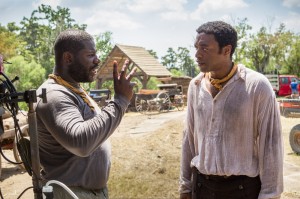
Director Steve McQueen, left, and actor Chiwetel Ejiofor during the filming of “12 Years A Slave.” (AP Photo/Fox Searchlight, Jaap Buitendijk)
McQueen’s film also boasts the best ensemble cast of the year. Ejiofor is terrific as the film’s center, effortlessly able to convey a variety of emotions without any dialogue. Benedict Cumberbatch (Star Trek Into Darkness) is great as Solomon’s first master, and Michael Fassbender — who starred in McQueen’s first two films — is even better as Solomon’s second, crueler master. Sarah Paulson, Paul Dano, Paul Giamatti, Alfre Woodard, Lupita Nyong’o, Michael K. Williams and Garret Dillahunt all deliver strong and fearless supporting performances.
It’s ironic that the film’s sole true misstep is the appearance of Brad Pitt towards the end of the film. Pitt, one of the film’s producers, appears in the film’s final ten minutes as Bass, the lone white character who opposes slavery and helps Solomon regain his freedom. Pitt doesn’t deliver a bad performance, but it’s certainly a distracting one. In a film with several high-profile celebrity cameos, Pitt’s is the only one that completely took me out the film. Most of the entire film casts a spell; it feels so realistic, so raw, so close that you almost forget that you’re watching a movie at times. Pitt completely disrupts that, reminding us once again that we’re watching a film. This is one of the rare disadvantages of being a movie star – it’s hard to make people forget that you’re giving a performance.
Nevertheless, 12 Years a Slave is a terrific movie. It’s this generation’s Schindler’s List. It’s an unforgettable film about a purely American tragedy.
Oscar Chances: Even though 12 Years is the most critically-acclaimed film of the year, it has little to no chance of winning most of the awards it’s nominated for. Best Production Design, Editing and Director will most likely go to Gravity. Best Costume Design will most likely go to The Great Gatsby, and Matthew McConaughey and Jared Leto from Dallas Buyers Club will most likely win Best Actor and Supporting Actor, respectively. However, Lupita Nyong’o is a lock for Supporting Actress, as is screenwriter John Ridley for Adapted Screenplay.
Best Picture has become the most interesting race this year. With Best Picture wins at both the Golden Globes and the Critics’ Choice Awards, 12 Years is currently the frontrunner to win the big prize. However, American Hustle and Gravity – two much more accessible, entertaining and commercially-successful films – have emerged as serious contenders. Hustle and Gravity both have the most Oscar nominations this year (tied at 10). Hustle just won the Screen Actors Guild Award for Best Acting Ensemble, which is usually a pretty good precursor for Best Picture. Gravity will inevitably win most of the technical awards. And as critically-lauded as 12 Years is, several Academy voters have avoided the film entirely, saying that it’s too “dark” and “depressing.” This might definitely work in favor of the other two films, which are much more conventional and uplifting.
So even though 12 Years does have a shot, I feel that either American Hustle or Gravity will win Best Picture, and 12 Years will win just two awards: Best Supporting Actor (Lupita Nyong’o) and Best Adapted Screenplay (John Ridley).

